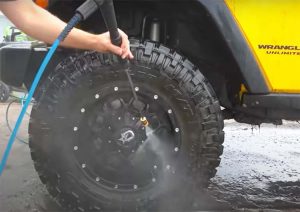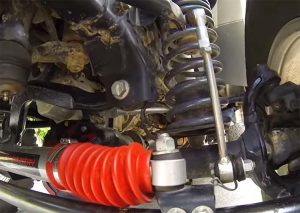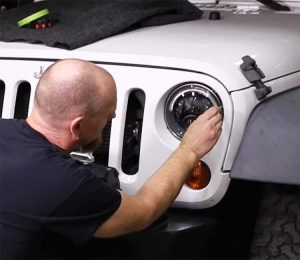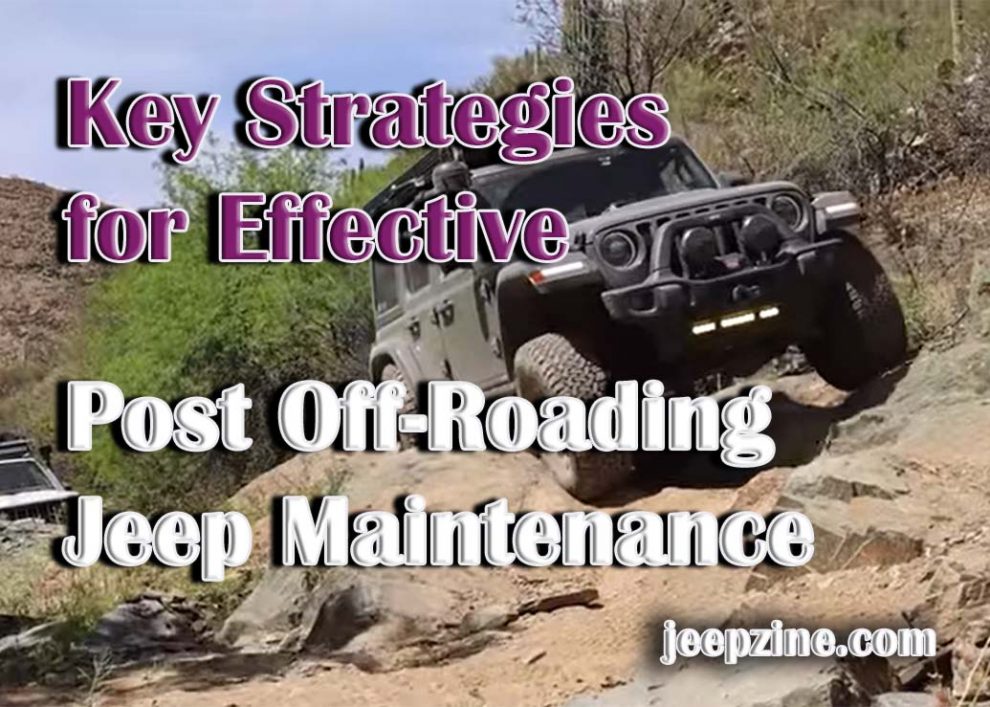This article outlines essential maintenance tips for Jeep owners who enjoy off-roading. It covers everything from basic cleaning techniques to detailed inspections of key vehicle systems, ensuring your Jeep remains reliable and ready for your next adventure.
After the thrill and rigor of jeep off-roading, performing thorough post off-roading Jeep maintenance is crucial to ensure your vehicle remains reliable and in excellent condition. This routine isn’t just about cleaning; it’s about systematically checking your Jeep for any potential issues that could compromise its performance or safety. Such maintenance is vital, not only for extending the lifespan of your Jeep but also for ensuring it is always ready and safe for your next adventurous outing.
Initial Vehicle Assessment
The first step in your maintenance routine should be a comprehensive inspection of your Jeep. Start by examining the exterior and interior for any visible damage that might have occurred during your off-road journey. Look for dents, leaks, or loose parts that could pose safety risks, especially if you plan to take the vehicle on public roads. Pay particular attention to the vehicle’s undercarriage and suspension, as these areas are most susceptible to damage from rough terrain. This initial inspection is critical to identifying issues that might require more detailed attention or immediate repair.
Cleaning Procedures

Tire Care and Maintenance
Tires often suffer the most during off-roading. After your adventure, it’s important to check and adjust your tire pressure. Off-roaders often reduce their tire pressure to improve traction on uneven surfaces, but driving on under-inflated tires on regular roads can damage the tires and affect the vehicle’s handling. Inspect each tire for damage such as cuts, abrasions, or embedded debris. Check the tread depth to ensure even wear and replace any tires that show excessive wear or damage. Proper tire maintenance is crucial for safe driving and to prevent further damage to your vehicle’s suspension and alignment. Also read about Off-Road Trail Etiquette.
Undercarriage and Differential Check
Post off-roading, it’s crucial to inspect the undercarriage for any damage or accumulation of debris that could impair your Jeep’s functionality. Pay special attention to the skid plates and differential housing, which are particularly susceptible to impacts with rocks and rough surfaces. Check for any signs of dents, cracks, or punctures that could expose vital components to further damage. Additionally, ensure that the differential fluids are checked for water contamination, especially if you’ve traversed waterlogged paths. Maintaining the integrity of the undercarriage protects critical components that are costly to repair if damaged.
Suspension System Check

Fluids and Mechanical Components Check
Regularly checking and maintaining the fluid levels in your Jeep is essential after any off-road adventure. Start by examining the engine oil, transmission fluid, coolant, and brake fluid to ensure they are at the correct levels and free from contamination. Off-roading can introduce water and debris into these fluids, which can degrade their quality and effectiveness. Additionally, inspect the fan or serpentine belts for any signs of wear or damage. Such components are critical for your Jeep’s operation and, if damaged, can lead to significant engine issues. Frequent checks will familiarize you with your engine compartment, making it easier to spot and diagnose potential problems early.
Brake System Examination
The brake system is one of the most crucial safety features in any vehicle, and its importance is magnified in off-roading conditions. Post-adventure, it is vital to inspect your brake pads, discs, and drums for wear or damage. Remove any debris that might have accumulated in the brake system, as mud, sand, and small stones can reduce braking efficiency and lead to premature wear. Additionally, check the brake fluid for cleanliness and top it off if necessary. Ensuring your brakes are in optimal condition is essential for safe driving, especially when transitioning back to regular road conditions.
Greasing Essential Components
After thoroughly washing and cleaning your Jeep post off-roading, it’s essential to proceed with greasing all necessary components. This step is vital in maintaining the vehicle’s mechanical health. Focus on applying a high-quality grease to crucial moving parts like ball joints, tie rod ends, and driveline components. This action should be performed once the Jeep is clean and dry to ensure that no dirt or moisture is sealed in, which could cause damage. Proper greasing after cleaning not only ensures smooth operation of these components but also protects them from premature wear and corrosion. Regular attention to these details helps maintain optimal performance and extends the lifespan of the vehicle’s critical systems.
Electrical Systems and Lighting Review

Air Filter Maintenance
Maintaining clean air filters is crucial for the optimal performance of your Jeep’s engine. Off-road environments, particularly dusty or muddy areas, can clog air filters very quickly, which can strain your engine and reduce its efficiency. Check your air filter after every off-road trip, and clean or replace it if it is dirty. Keeping the air filter clean ensures that your engine gets the clean air it needs for combustion, helping to maintain its performance and prevent costly engine repairs.
Conclusion
By diligently following these comprehensive post off-roading Jeep maintenance steps, you ensure that your Jeep remains in peak condition, ready for your next adventure. Each step, from basic cleaning to detailed inspections of mechanical systems, plays a vital role in extending the lifespan of your vehicle and ensuring it performs safely and reliably. Regular maintenance not only helps avoid expensive repairs but also ensures that your Jeep is always prepared to handle the demands of off-road driving, providing you with confidence and peace of mind on and off the trails.

